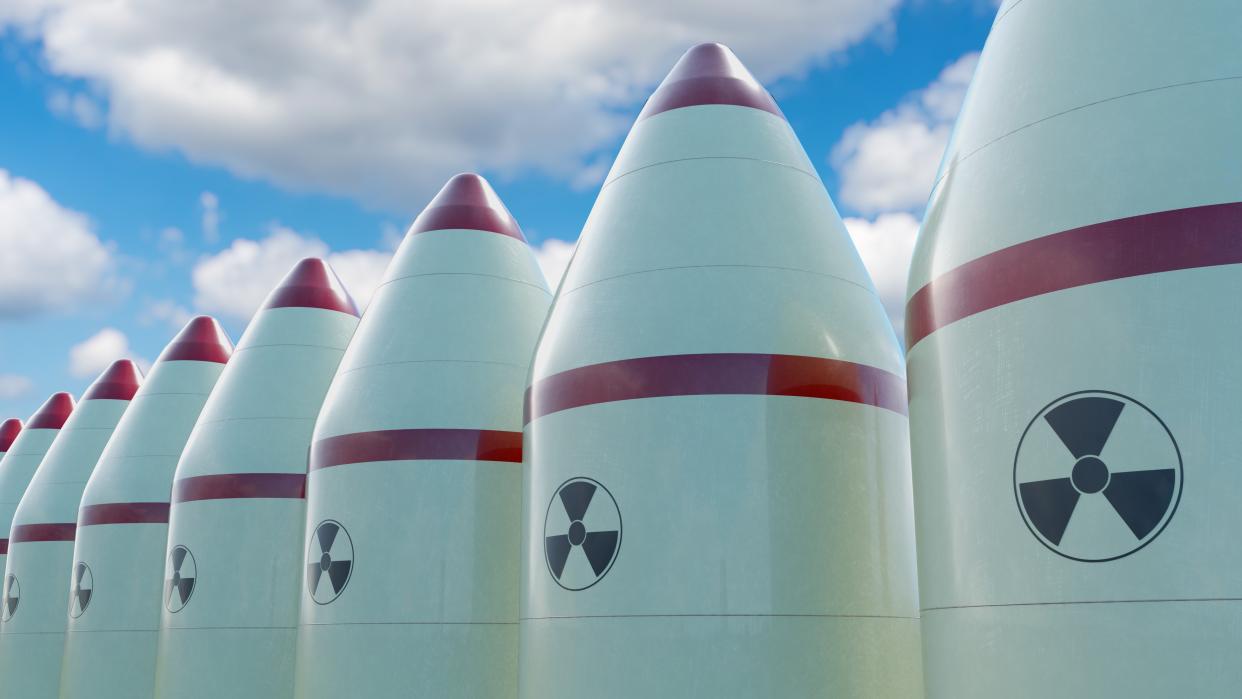Dr. Karl-Heinz Kamp

License
All rights reserved
Copyright owner
IMAGO / Pond5 Images
What should be done if a future US President like Donald Trump decides to withdraw the nuclear umbrella from Europe? Should Germany buy a thousand nuclear warheads or seek shelter under France’s protection? The current debate in Germany reveals a profound lack of understanding.
In the politically charged atmosphere of Germany, another idea is being put on parade. This time, the typically erratic yet dangerous remarks of potential US presidential candidate Donald Trump regarding the withdrawal from NATO’s mutual defense commitments have sparked what the Federal Republic hasn’t seen in a long time: a veritable debate on nuclear policy.
A politician from Germany’s center-left Social Democratic Party (SPD), who previously had successfully concealed her expertise in security policy, pondered over the European Union’s independent nuclear deterrent capability should a Republican move into the White House. Given that the EU lacks a unified government or a head of state capable of nuclear command, how this would materialize remains uncertain. Clearly, such decisions can’t be made during lengthy night sessions in Brussels that end in a majority vote.
However, a German historian, proving that knowledge of history equates to expertise in nuclear strategy, seriously proposed a shared “red button” for launching nuclear weapons that would be passed like a trophy from capital to capital. While original, the thought of Viktor Orbán being at the nuclear helm one day certainly stirs unease – and not just within the EU.
Buy a Thousand Nuclear Warheads
From the academic sphere came a seemingly sincere suggestion for Germany to purchase a thousand nuclear warheads from the United States. This would place German Chancellor Olaf Scholz at the nuclear controls, freeing him from having to coordinate with Orbán. The fact that Germany is a signatory to the Nuclear Non-Proliferation Treaty, which allows only the United States, Russia, France, the United Kingdom, and China to possess nuclear weapons and demands nuclear abstinence from all other signatories? Merely a detail. That Germany is legally bound to a permanent renunciation of weapons of mass destruction, including nuclear arms, in the Treaty on the Unification of Germany? A triviality. That no serious political voice in Germany is calling for the country’s own nuclear arsenal, not even the nationalists from the far-right Alternative for Germany (AfD)? Apparently, not a concern.
Weighed against such creativity, the rather traditional proposal for France to assume nuclear deterrence for Germany and other EU members, should the United States retract, seems almost quaint. Perhaps a sober look at the facts could steer this overheated debate back on track.
Only with Congressional Approval
For starters, discussing preparations for a potential President Trump, who despises alliances in general and NATO and Germany in particular, is both sensible and necessary. Moreover, the debate on maintaining nuclear deterrence against an aggressive Russia and Germany’s contributions is long overdue.
However, Donald Trump still has a long way to go before being reelected president, and a withdrawal of the United States from NATO can only be decided with the approval of the US Congress. While Trump could severely damage transatlantic relations (beyond just NATO), it’s doubtful that he could single-handedly erase 75 years of close, trusting cooperation in the Western defense alliance. The vast majority of the US security policy establishment would oppose such a move.
Nuclear Security Guarantees
Nonetheless, as hope alone cannot replace policy, planning for the worst-case scenario is worthwhile. What if President Trump announces he will no longer support the Alliance, through conventional or nuclear means? Initially, the popular idea that, in such a scenario, France could extend its nuclear umbrella over Germany and Europe falters on French political principles. Paris outright rejects the concept of “Extended Deterrence” in which a nuclear state provides nuclear security guarantees to a non-nuclear ally.
For France, nuclear weapons are national assets designed solely for the protection of its own territory. Hence, France developed its nuclear capability rather than relying on the US umbrella. No French president since Charles de Gaulle has altered this stance. However, the good news is that NATO has two European nuclear powers: France and the UK. Both are recognized in all NATO documents as independent decision centers. This complicates the calculations of aggressors as they must consider three potential nuclear responses.
Would these relatively small arsenals suffice to deter Russia if the United States withdrew its nuclear protection over Europe? No one knows. Yet deterrence is not solely about the number of missiles but also the attacker’s perception. Could Putin be certain that London and Paris wouldn’t launch a nuclear response to an attack on Poland? A miscalculation could inflict devastating damage on Russia that far outweighs any perceived “benefit” from the assault. Does this mean US nuclear protection could be easily replaced? Certainly not, but its absence wouldn’t entirely eliminate deterrence.
A Dialogue on Nuclear Deterrence
What should Germany and Europe do to maintain their security in the worst-case Trump scenario? First, continue the strengthening of their defense capabilities that began after Russia’s large-scale invasion of Ukraine. Here, the German government has set an important precedent with its “Zeitenwende.” Yet it’s scandalous that wealthy NATO states – such as Norway, Italy, or Canada – remain significantly below the required two percent of GDP for defense spending.
Second, Germany should accept France’s longstanding offer to engage in a dialogue on nuclear deterrence. This would not replace but complement NATO’s nuclear debates within its Nuclear Planning Group. This dialogue should also include the UK and, depending on interest, other key EU member states. Paris and London have already been conducting such a dialogue to better understand each other’s strategies and nuclear concepts.
Third, Germany, in particular, needs to reactivate its Cold War-era understanding of nuclear deterrence fundamentals. NATO refers to this as “strengthening the nuclear IQ.” The number of professors in Germany addressing nuclear deterrence in their seminars is disappointingly low. Even at the Bundeswehr Command and Staff College nuclear issues are marginal. There’s a significant need to catch up. By broadening knowledge of the benefits and dilemmas of nuclear deterrence, a meaningful nuclear debate can be conducted – one that truly deserves the name.
BIBLIOGRAPHIC DATA
This text is a translation of an article that was originally published in German in Cicero - Magazin für politische Kultur on February 16, 2024.
PROGRAM
Center for Order and Governance in Eastern Europe, Russia, and Central Asia

Dr. Karl-Heinz Kamp
No comments:
Post a Comment